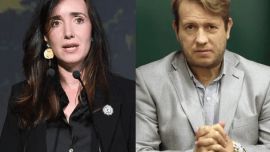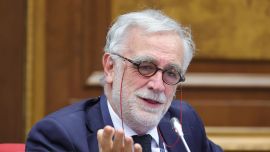The Kirchnerite critique of President Alberto Fernández’s government omits how conditioned it is by reality. It establishes limitations very different to those seen during the first three Kirchner presidencies. These include the impoverishment produced by the four years of Mauricio Macri’s government, as well as Cristina Fernández de Kirchner’s second term when the deterioration was already evident – otherwise they would never have lost the 2015 election against Macri.
From 2003 to 2013 – an entire decade – Argentina’s opposition was totally fragmented, while Alberto Fernández has had to govern against the Juntos por el Cambio coalition maintaining a 40-percent floor of the national vote, even in defeat. A very different situation to 2011, when the rival candidate with the most votes was the socialist politician Hermes Binner with only 17 percent. The other votes went to Ricardo Alfonsín with 11 percent, Alberto Rodríguez Saá with eight percent, Eduardo Duhalde with six percent and Jorge Altamira and Elisa Carrió with two percent each.
The first contradiction arising from analysis is that if in 2019 Cristina Fernández Kirchner chose somebody different to top her ticket, it was because she herself would not have won or would not have been able to govern subsequently. Alberto Fernández should not be asked to act as if he were Cristina.
Another contradiction resides in that if Cristina is considered the desirable presidential candidate for 2023 (when her own evaluation reached the opposite conclusion in 2019), that would only be possible if the four years of Alberto Fernández had operated as a beneficial period of transition for her image and/or the economic future of Argentina. That would make the country easier to govern.
Only the latter could be arguable in the event of a more promising future, not being the work of Alberto Fernández but a stroke of luck in a context without a pandemic (and with no war either) and with Vaca Muerta’s shale up and running plus lithium and mining online, but even in that case this would be recognising that good fortune eluded the current president. He has had to cope with greater constraints.
Journalist Horacio Verbitsky recently commented during an interview with Radio Perfil that Cristina Fernández de Kirchner knows better than anybody else that, without improvements in the personal economy of the voters, no candidate from the ruling Frente de Todos coalition – including herself – could triumph in next year’s elections.
But it is probable that the situation within the ruling coalition leaves Cristina with no other alternative than to be the candidate, even knowing that she is going to lose upfront. Public presentations like the November 17 rally in La Plata would end up damaging her relationship with her followers and the officials who depend on her to carry on if they generate expectations which are not subsequently satisfied.
Having said: “I’ll do what I have to do” and “everything in due measure and harmoniously,” the vice-president’s adherents were induced to interpret that she would be a candidate. Expectations with a certain logic from her own political camp because they do not feel represented by an indecisive Alberto Fernández, nor by the “right-wing” (as they put it) ideology of Sergio Massa. That leaves Buenos Aires Province Governor Axel Kicillof and Interior Minister Eduardo ‘Wado’ de Pedro (the only two leaders joining Cristina on the stage at her La Plata rally) and one of them will need to be the gubernatorial candidate in the region’s key battleground.
Perhaps the Kirchnerite 2023 presidential ticket may end up essentially inverting 2019. Instead of having Fernández de Kirchner as the running-mate of a moderate presidential candidate, next year could see a role reversal. with the running-mate playing the role of moderate. In that case Wado de Pedro would respond to that profile very fittingly.
Social leader and lawyer Juan Grabois has been accompanying De Pedro on campaign swings in various provinces for some months now. They were recently in Chaco and Corrientes opening the Fourth Asamblea por un Desarrollo Integral para una Argentina Humana y Federal (“Assembly for the Integral Development of a Humane and Federal Argentina”). Grabois could be the confrontational candidate to complement a moderate of some kind.
That too would be the profile of Kicillof, a politician with much more knowledge and experience of public administration in the two most delicate state posts after the Presidency: national economy minister and Buenos Aires Province governor. Kicillof seems the most logical candidate to seek re-election in the province he has governed since 2019 despite other politicians with credentials being interested in occupying his place. The appearance of embezzlement denunciations against his provincial security minister, Sergio Berni, is rumoured to be “friendly fire” aimed at Kicillof himself.
Cristina with Wado as the presidential ticket and Kicillof as the gubernatorial candidate for Buenos Aires Province seems a probable trio. Should Fernández de Kirchner finally head the presidential ticket and win, her vice-president would not only be important in the 2023-2027 presidential term, including as a possible replacement in any upheaval, but also for the 2027-2031 term since Cristina could not be re-elected in 2027 after having formed part of the ruling presidential ticket for two consecutive terms (the best case scenario for her and her followers).
On the night he defeated incumbent leader Jair Bolsonaro in Brazil’s run-off, Luiz Inácio Lula da Silva donned a cap reading “Cristina 2023.” There is no ingenuity when you have Lula’s level of experience.
– – –
Sergio Massa’s situation is related to Cristina Fernández de Kirchner’s. He does not control the possibility of his own presidential candidacy.
Following the recent La Plata rally and probably following the attempt on her life, Argentina’s vice-president may well have embarked upon a path which will lead to her being unable to avoid a 2023 Casa Rosada candidacy, since she – like no other Frente de Todos candidate – could be a guarantee not just of victory but even of an honourable defeat for pan-Peronism.
Massa does not control his immediate future. His negative opinion poll ratings are similar to those of Fernández de Kirchner, Alberto Fernández and Mauricio Macri, who have all had the responsibility of governing and disappointing but he, without having had the opportunity of the top job, accumulates the same levels of rejection.
But the degrading terms pegged to him in the opinion polls – “panqueque (flip-flop)”, “chanta (loudmouth)”, “low credibility” or (as baptised by somebody who deep down envies him) “ventajita (petty opportunist)” – could end up, depending on the context, being attributes like flexibility, pragmatism, straddling the grieta rift and even an “ethical” approach to his responsibilities. A shift in perspective is possible for a society depending in large measure on the results of his economic management during the next few months, as well as Cristina’s eventual decision whether or not to be a candidate.
A year ago Massa was maintaining that he would not present himself in the PASO primaries as a candidate if Alberto Fernández ran for re-election but would not hesitate to do so if he had to dispute the top Frente de Todos representation with a Kirchnerite candidate. Back then he imagined the latter to be Axel Kicillof, to whom Eduardo ‘Wado’ de Pedro would need to be added today. Since he became economy minister, Massa has been maintaining that he will not run in next year’s race and that he is thinking more of constructing a reputation and consolidating his image as a problem-solver taking charge of difficult situations. That would allow him to compete for the presidency in 2027. Given that he turns 50 only this year, he could compete in 2027, 2031, 2035, 2039 and even beyond that.
But, like Cristina Fernández Kirchner, that is something Massa does not control – were his economic experiment to be successful, he probably would end up being the natural Frente de Todos candidate for 2023. And if it did not succeed, he would not be able to run in 2027 or in the following four years either. His destiny, like that of another rapid political mind, ex-lawmaker and former interior minister José Luis Manzano, might then seem to lie in dedication to private activity and business,
If Sergio Massa’s economic strategy had to be summarised, it might be said that rather than relying on a consistent macroeconomic model or theory (like everybody who has studied economics systematically), the Tigre leader stakes his claim to success on being the smartest and hardest-working. Paradoxically there is something Soviet about Massa’s economic vision – the Soviet Union’s Gosplan (Gosudárstvenny Komitet po Planírovaniyu), the famous and deterministic Planning Ministry occupying the main building in front of the Kremlin in Moscow – since he believes in the premise that with much speed, intelligence and endeavour it is possible to beat the market in planning better the needs for each micro-moment. In today’s Argentina there is the dólar soja, dólar soja II, dólar Qatar, dólar tarjeta, etc... The Soviet mathematicians even decided what colour the dresses of 15-year-olds should be every year, believing that they could do more efficiently than the CEOs of the Western fashion houses meeting annually in París.
Niccolo Machiavelli’s Prínce needed both a strong will and good luck. Massa has plenty of strong will, which has often played against him when transformed into a hyperkinetic energy which the passage of time is tending to correct. Like the sculptor working on marble, time can seep away energy and almost never adds it.
And perhaps Lady Luck might have reserved for this king of tacticians a strategic play which is also theoretically consistent instead of inventing every week a different exchange rate or “precios cuidados, justos, solidarios” price controls plus a second, third or fourth system of obtaining import permits to stem the drainage of foreign currency. Such a play would concede him the Rosetta Stone to decipher the solution to inflation – a loan of US$15 billion from the Brazilian Central Bank under the Lula Presidency, which together with a Chinese currency swap would enable sufficient reserves to be accumulated to unify the exchange rate and launch a plan against inflation anchored on the dollar.
Even without that present from the gods (which would also be thanks to Alberto Fernández due to his special relationship with Lula), Massa aspires that if he does not succeed in lowering inflation drastically, it will be valued that he never preferred to lower it via recession, opting between these two evils (like most of the population) in favour of higher growth over lower inflation.
In any of these cases, having accumulated at the age of 50 the experiences of having been Cabinet chief, the founder of a party which won the elections in the country’s most populous district, Congress speaker and economy minister transforms him into a recurrent presidential candidate.
























Comments